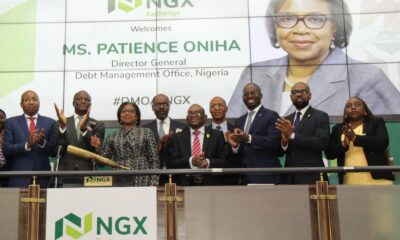According to Nigeria’s Debt Management Office (DMO), total public debt increased by 75% q/q or N38.5trn to N87.4trn at end-June ’23. On a y/y basis, public debt increased by 104%. As at end-June ’23, public debt was equivalent to 43.7% of 2022 nominal GDP. This is above the DMOs debt-to-GDP ratio target of 40% within 2020-2023.
However, still below the limit of 55% set by the World Bank for countries within Nigeria’s peer group. We note that Nigeria’s debt-to-GDP ratio is relatively low when compared with other African emerging economies such as Ghana (88.8%), Egypt (87.2%), South Africa (67.4%), Kenya (67.3%).
The rise in the public debt stock can be largely attributed to the recent inclusion of the securitized N22.7trn CBN ways and means advances to the FGN. The fx depreciation triggered by the fx liberalization policy also contributed to the surge in the total public debt stock. To put this in perspective, at end-June ’22 the fx rate closed at N425.1 per USD (NAFEX) vs N769 per USD at end-June ’23.
As for total domestic debt, we noticed a 68% q/q increase to N54trn at end-June ’23. There were q/q increases recorded across FGN bonds (127.7% q/q), FGN Savings bond (10.4% q/q) and promissory notes (3.7% q/q). The DMO had set out to raise a maximum of N3.6trn at end-Q3 ’23 through FGN bonds. However, YTD, it has raised N4.3trn (exceeding its borrowing target by 19.4%). The FY 2023 domestic borrowing target of N7.04trn will likely be exceeded.
The domestic debt for states and the FCT increased by 7.4% q/q to N5.8trn at end-June ’23 from N5.4trn recorded at end-March ’23. On a y/y basis, it grew by 20.8%. The most indebted states include Lagos (N996.4bn), Delta (N465.4bn), Ogun (N293.2bn), Rivers (N225.5bn) and Imo (N220.8bn).
Meanwhile, the external debt stock increased marginally by 1.4% q/q to USD43.2bn at endJune ’23 compared with USD42.6bn recorded at end-March ’23. Multilateral lenders such as the World Bank, IMF, AFDB, as well as bilateral lenders like China, Japan, India, and France collectively accounted for 60.9% of the external debt stock while commercial loans (Eurobonds and Diaspora bonds), promissory notes and syndicated loans accounted for 39.1% Turning to debt servicing, we note that as at end-June ’23, the FGN has spent N2.34trn on debt servicing (N1.44trn on domestic and N900bn on external).
Based on latest data in the public domain (i.e., as at end-March ’23), the debt-service-to-revenue ratio stood at 83%. We expect debt service costs to remain elevated (in nominal terms) due to the impact of the fx liberalization policy and additional borrowing on the back of the FGN budget deficit.
In a separate report by the DMO, the debt-service-to-revenue ratio for 2023 was pegged at 75%, reflecting the urgent need to improve government revenue. According to the DMO, to achieve a sustainable debt-to-GDP ratio, the FGN needs to increase its revenue base from the projected N10.5trn for FY 2023 to c.N15.5trn.
The constraints around government revenue growth have led to overreliance on borrowing to finance the FGN budget. There are deliberate efforts towards strengthening the fiscal landscape. The current administration has set up a Fiscal Policy and Tax Reforms Committee. We expect the committee’s efforts to assist with ensuring a minimum tax-to-GDP ratio of 18% by 2026, expand the tax net, and eliminate the tax gaps. Based on industry sources, it is estimated that Nigeria loses c.N20trn annually on the back of incidences of tax evasion.

 Forex3 weeks ago
Forex3 weeks ago
 Naira3 weeks ago
Naira3 weeks ago
 Billionaire Watch2 weeks ago
Billionaire Watch2 weeks ago



 Naira3 weeks ago
Naira3 weeks ago






 Naira2 weeks ago
Naira2 weeks ago




 Naira1 week ago
Naira1 week ago




 Naira4 weeks ago
Naira4 weeks ago






 Naira1 week ago
Naira1 week ago
























